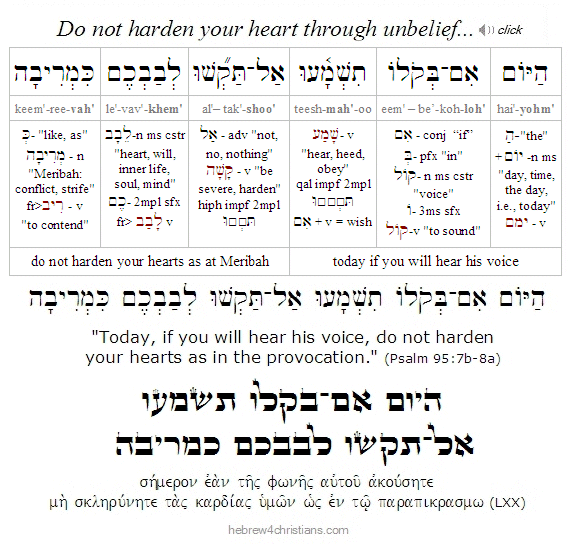|
Some of the sages have called this week's Torah portion (i.e., Beha'alotekha) "Sefer Kvetch," the Book of Complaint, since the very first stage of the journey back to the Promised Land upon departing from Mount Sinai was marked with murmuring, ingratitude, and fantasies about the "good old days" when the people ate "free fish" in Egypt, and so on. The repeated episodes of complaining really were a form of rebellion against God's leadership, as the people blasphemously charged the LORD with folly, incompetence, or even malice ("Why did God take us out of Egypt - to kill us all in the desert?"). Indeed, the spiritual condition of the people was so bad that they were all doomed to die in the desert. The New Testament later identifies the unbelief of the people as a picture of blasphemy of the Holy Spirit (Heb. 3:7-4:6).
Often the Israelites appeared to behave like spoiled children, demanding "real food" and fussing over the miraculous supply of bread that literally came from heaven (manna)... It would be somewhat comical were it not so tragic: Despite all the miracles the people had directly experienced during the great Exodus - including the splitting of the Sea, the Pillar Cloud of Cloud by day and Fire by night, leading to the awesome revelation at Sinai - despite all this - in a little over a year the memory of Egypt had become positively euphoric, and the people "forgot" how degrading their lives were as slaves... They romanticized the way things were, rationalizing that it wasn't "that bad," and savored the taste of their "free fish..."
Therefore a central commandment of this Torah portion is: "Thou Shalt Not Kvetch" (or, put positively, "Thou Shalt be Grateful"). "The deeds of the fathers are signs for the children" (1 Cor. 10:11) and therefore we are sternly warned not to follow the example of those who were redeemed by God's outstretched hand but who later drew back in fear and unbelief, as it is written: "I swore in my wrath, 'They shall not enter my rest.' Take care, brothers, lest there be in any of you an evil, unbelieving heart, leading you to fall away from the living God. But exhort one another every day, as long as it is called "today," that none of you may be hardened by the deceitfulness of sin. For we have come to share in Messiah if indeed we hold our original confidence firm to the end. As it is written, "Today, if you hear his voice, do not harden your hearts as in the rebellion" (Heb. 3:11-16).
Hebrew Lesson
Psalm 95:7-8 Hebrew reading (click):
The Unhappy End of Unbelief...
The price for Israel's unbelief was great... The narrative of Torah was supposed to have ended after the Exodus generation left Sinai to enter the Promised Land with the completed Tabernacle... Unfortunately, things did not work out that way, and "Sefer Kvetch" begins with Numbers chapter 11. According to the Talmud, the scribes marked this "unhappy ending" by putting an "inverted Nun" before and after Numbers 10:35-36 to mark a break in the (ideal) narrative. What should have been written (beginning with chapter 11) was the "happy ending," namely, that the redeemed Israelites successfully entered the land because they kept faith in the LORD's promises. In other words, the account of the sin of the spies, the apostasy at Kadesh, the exile of the Exodus generation, etc., should never have happened. The sages said that marking the text this way affirms that what should have been written (as the happy ending) will one day be so written, after the Messiah comes to finally deliver the Jewish people. For more on this subject, see the article, "The Seven Books of Moses."
Hebrew Lesson
Psalm 14:1 Hebrew reading (click):
|




